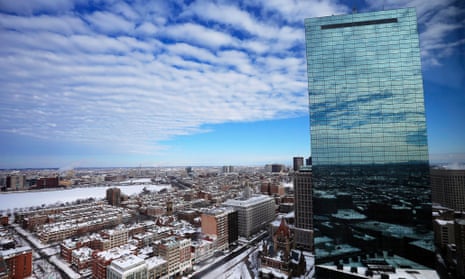Employees at some New England companies are “digging out and digging in” today, returning to work after 24 to 36 hours away, while others conducted business as usual as the storm named Juno left up to three feet of snow in its path.
Companies such as Fortune 500 defense contractor Raytheon, cranberry processor Ocean Spray of Massachusetts and outdoor clothing and gear supplier LL Bean of Maine mostly took cues from local and state authorities and advised most or all employees to stay home late Monday and all day Tuesday, with a return to normal workplace schedules today.
“It was a very intense period, but everything worked as planned,” said Michael Doble, director of corporate public relations for Raytheon, headquartered in Waltham, Massachusetts. He said the blizzard compelled the company, with employees in Rhode Island and New Hampshire, to keep more than 12,000 at home for the first time ever. “This was exceptional,” he said.
Officials at area companies cited employee safety as the top priority in deciding to close down plants, offices and warehouses.
Still, not everyone stayed home: plant managers at Raytheon worked around the clock to provide feedback about on-site conditions to corporate officials.
And employees at LL Bean’s flagship store in Freeport, Maine, followed the company tradition of keeping the doors open, come what may. The store has no locks on the door and is open 24 hours a day, 365 days a year, spokeswoman Carolyn Beem said. “We kept the store open and some local people came out, since there’s coffee, stuff to play with and gear to try on,” she said. (However, more than 600 employees at the company’s factory and distribution centers stayed home, Beem added.)
Meanwhile, in New York City, opinion remains divided about whether businesses and city officials overreacted to a storm that ended up being less than historic. Others debated whether it was ethical to expect the sort of services standard to New York life during a storm, such as delivery from restaurants, as this could put employees in danger.
In the end, most companies erred on the side of caution, placing employee safety above any possible concerns about productivity, sales or even reputation. Most companies in the region said that staying closed for a day or two would not have a great impact on the company’s bottom line anyway. Michael Doble, of Raytheon, said his company will review the experience next week “to see what went well and what needs to be changed.”
After Raytheon’s chairman, Thomas Kennedy, made the call at approximately 5pm Monday to send most employees home, Raytheon communicated the decision to its different branches by Intranet, mass emails, and – through an outside vendor – by text message and voicemail. The company also established a toll-free number, and announced the closing of its New England branches on local radio stations as well.
On Wednesday, some employees at The Hartford insurance company’s Boston branch were still unable to return to work – after more than 7,000 employees stayed home at the company’s three Connecticut offices Tuesday. “We encouraged employees to stay home and stay safe,” spokesman Tom Hambrick said.
Regional mainstay Ocean Spray – located only 15 miles south of Plymouth, Massachusetts, which The Weather Channel’s Mike Seidel said suffered “the worst of winter storm Juno” – was just ramping up production Wednesday morning after being shut down for 36 hours. Corporate leaders sent an email Monday morning communicating the decision to cancel the night shift and close plant and corporate offices Tuesday, sending 700 employees home.
Phil Samson, a principal at consulting company PwC, said companies should not only have plans in place to allow employees to work remotely, whether online or via teleconferencing or videoconferencing, but also to allow employees to have working meetings in offsite locations, if necessary. “People like to get together,” he said.
Also, events like Juno can be seen as opportunities for evaluating such practices as video conferencing. “You can ask, ‘Can more meetings be done remotely in the future?’” he said. “What might you have learned in terms of productivity that can be used in the future?” Debriefing after a storm like this is important, as it allows a company to ask such questions, he added.
Beem at LL Bean said she enjoyed the storm, adding that the 105-year-old company, with more than $1.5bn in annual sales, will also not feel much of an impact. “For most of us, it was kind of fun, and shakes things up a bit,” she said. “Now it’s kind of business as usual. And you have to remember, you’re not in control of everything.”
The social impact hub is funded by Anglo American. All content is editorially independent except for pieces labelled “brought to you by’” Find out more here.

Comments (…)
Sign in or create your Guardian account to join the discussion